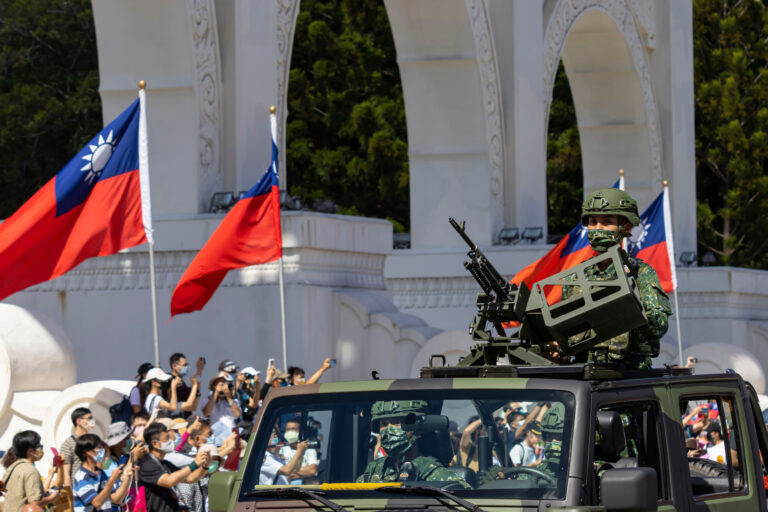Michael Mazza is a senior non-resident fellow at GTI. He is also a visiting fellow in foreign and defense policy studies at the American Enterprise Institute (AEI), where he analyzes US defense policy in the Asia-Pacific region.
In a June 17 story about a supposed split over Taiwan arms sales within the Trump administration, the Wall Street Journal reported, “It took some convincing, but Mr. Trump came around … and he now sees the value in using Taiwan as a bargaining chip in his talks with China.” It was a devastating sentence for Taiwan’s leaders and for supporters of the US-Taiwan relationship to read. Taipei has been worried about being conceived of as a “bargaining chip” since the early days of Donald Trump’s presidency, when he backed off his earlier questioning of the “one China policy” and instead committed to it in order, ostensibly, to secure a phone call with Chinese leader Xi Jinping. Early excitement following President Tsai Ing-wen’s own congratulatory phone call with President-elect Trump quickly shifted to a feeling of nervousness and potential foreboding.
Nerves calmed as worst fears did not come to fruition, with a number of Taiwan-friendly officials taking positions at the National Security Council, State Department, and Defense Department, with the president signing bills designed to improve US-Taiwan relations, and with the administration seeming to move to a regular arms sales process. Over the past two years, senior administration officials including Vice President Mike Pence, Secretary of State Mike Pompeo, National Security Advisor John Bolton, former Permanent Representative to the United Nations Nikki Haley, Ambassador at Large for International Religious Freedom Sam Brownback, and Assistant Secretary of Defense for Indo-Pacific Security Affairs Randall Schriver have spoken publicly about Taiwan in positive terms. Indeed, it has become common to describe US-Taiwan relations as the best they have been in many years, perhaps since the severing of formal relations in 1979. Yet concerns have lingered about the president’s own views of the island, which remain unclear.
The Wall Street Journal story dropped with US-China trade negotiations in a prolonged stalemate. The G20 summit was approaching and Xi Jinping had not yet agreed to a sidelines sit-down with President Trump in Osaka. According to the Journal, there were growing concerns within the administration that Xi might use the potential sale of new tanks and other arms “as one more excuse not to meet.” The real concern, of course, was not that President Trump would trade an arms sale for a meeting, but that he would do so as part of a trade deal. Although the G20 seemed unlikely to significantly affect Taiwan’s status in Washington, the possibility could not be ruled out.
Increasing Trade Ties
Any concerns that US-Taiwan relations would take a hit in the summit’s aftermath have thus far proven unfounded. Indeed, there was a glut of good news in the days immediately preceding and following the Osaka meetings.
Just before the G20, it was reported that American pork exports to Taiwan “are surging in 2019.” Compared to the same period last year, pork exports through April 2019 grew by 80 percent in metric tons and by 55 percent in dollar value. The same report noted that in 2018, US beef exports to Taiwan exceeded $500 million for the first time, and “nearly doubled in volume and more than doubled in value over a period of just five years.”
Taiwan’s restrictions on the import of American beef and especially pork have long been a thorn in the side of US-Taiwan trade relations. This new data supports the contention that such restrictions are not the salient hindrance to US exports and thus to deeper trade ties that they once were (as Dan Blumenthal and I argued in a paper earlier this year for the Project 2049 Institute). A bilateral free trade agreement has long been a top priority for the Tsai administration. President Tsai can wield this news to contrast Taiwan favorably with China, which has cut agricultural imports from the United States, and to make the case that a free trade agreement would further benefit American farmers.
Visit-like Transits
And now, President Tsai can make that case to Americans directly. On July 1, Taiwan’s Ministry of Foreign Affairs announced that President Tsai would soon visit four diplomatic allies in the Caribbean, a trip to be punctuated by two “transit” stops in the United States. Each US visit would be a two-night stay, allowing plenty of time for engagement with government, business, and civil society leaders. (Typically, Taiwan’s presidents spend only one night in the United States on a “transit” stop.)
Last week, President Tsai made her first transit, stopping in New York City on her way to Haiti, St. Vincent and the Grenadines, St. Lucia, and St. Christopher and Nevis. While in New York, she hosted a reception for the United Nations representatives of Taiwan’s diplomatic allies, met with business leaders, strolled through Central Park with young expats from Taiwan, delivered an address at Columbia University, and spoke by phone with Speaker of the House of Representatives Nancy Pelosi.
Washington’s accommodation of Tsai’s travels is as good a sign as any that the US-Taiwan relationship remains on firm footing. Beijing always raises stern objections to presidential transits of the United States as such transits are seen as conferring legitimacy on the so-called “Taiwan authorities.” That the Trump administration is welcoming and indeed facilitating two (relatively) extended stays over the course of eleven days suggests that the administration does not see its relationship with Taiwan as leverage to put to use vis-à-vis Beijing.
Arms Sales
Need more evidence? Just last week, following approval from the Department of State, the Defense Security Cooperation Agency notified Congress of two impending arms sales to Taiwan. The sales are substantial. The first package is to include 108 M1A2T Abrams tanks and associated equipment, support, and training for a cost of approximately $2 billion. The second package is a $224 million sale of Stinger missiles and related equipment and support. These arms will better enable Taiwan to defend its airspace, counter an invasion, and thus deter Chinese aggression.
On cue, Chinese foreign ministry spokesman Geng Shuang claimed the sale “flagrantly interferes in China’s domestic affairs and harms China’s sovereignty and security interests,” and called on the United States to “cancel this arms sale immediately and stop military ties with Taiwan to prevent further damage to China-US relations and peace and stability across the Taiwan Strait.” China signaled its displeasure at the potential sale prior to the notification as well. It is even possible that Xi raised it directly with President Trump during their meeting in Japan. However Chinese objections were raised, those objections were not persuasive to leaders in Washington.
In short, the US-Taiwan relationship does not appear to be for sale. Of course, even given positive developments over the last two years, there is no guarantee of future progress in the relationship, especially as Beijing continues to pressure the Trump administration to distance itself from Taipei and with President Trump’s personal commitment to the relationship remaining a question mark. What’s more, aside from ongoing negotiations over the sale of F-16s, it is unclear what comes next for Washington and Taipei, with the presidential transits and finalization of the recently notified arms sales soon to be in the rearview mirror.
Moving Towards a Bilateral Agenda
In order to give impetus to continuing advances in US-Taiwan relations (and thus to make it even more valuable to the United States, making it all the more difficult for anyone to bargain away), the two governments should agree to a shared agenda—a succinct but wide-ranging public plan to deepen ties that both sides can use to measure progress and to hold each other accountable. Such an agenda could be negotiated by the director of American Institute in Taiwan and his counterparts at the Ministry of Foreign Affairs in Taipei before approval by senior leaders. It should be specific enough to necessitate genuine action to meet goals described, but vague enough to allow flexibility in what those actions should be (e.g., the agenda should not specify the provision of specific defense articles).
The Trump and Tsai administrations both deserve praise for advancing the bilateral relationship, but there is no clear, agreed-upon roadmap for the relationship’s future direction. Setting forth such a roadmap or agenda will help to inure the relationship against forces that might seek to push the United States and Taiwan apart. It would also help to prevent leaders in either capital from sitting on their laurels after a significant accomplishment, such as a major arms sale, as there would remain yet more to accomplish. Under the Trump and Tsai administrations, the US-Taiwan relationship has reached new heights. There is no reason it cannot soar even higher.
The main point: The past two years have seen continued advances in US-Taiwan relations, despite fears that the Trump administration would use Taiwan as bargaining chip in US-China relations. A joint agenda for the relationship would help ensure that bilateral ties continue to deepen in the years ahead.




